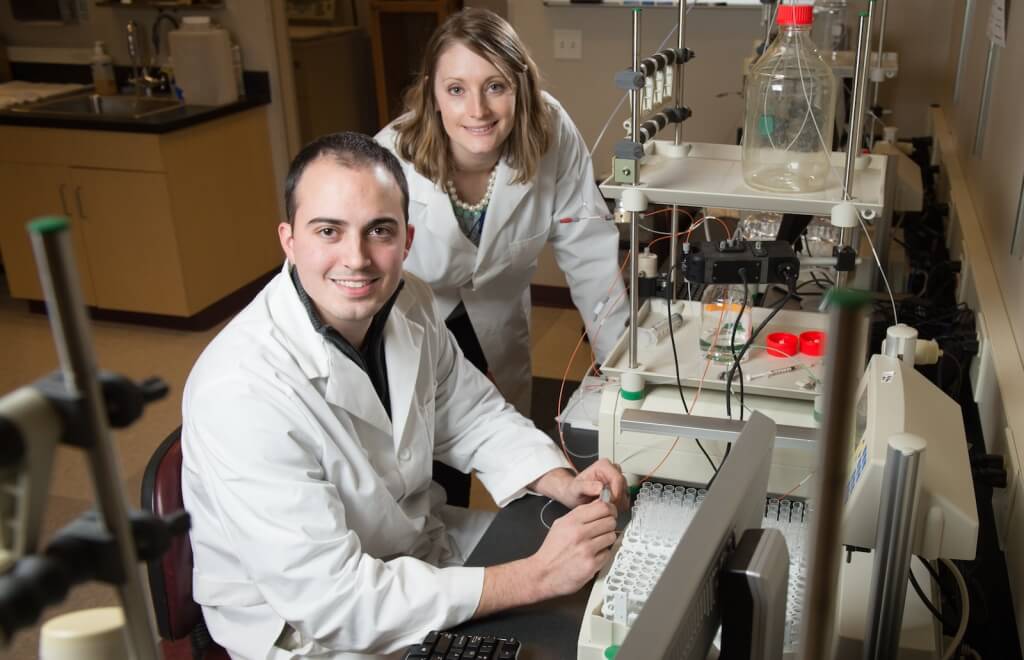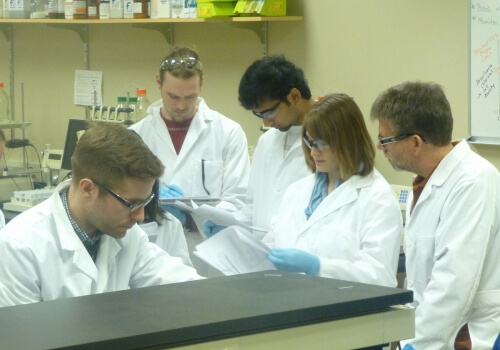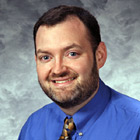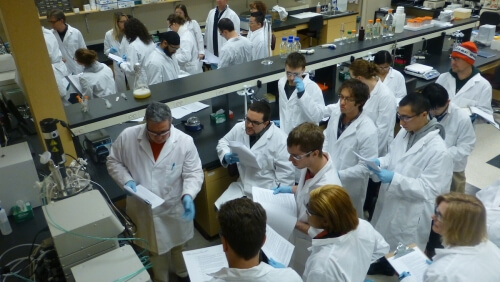Madison, Wisconsin, USA
February 3, 2016

Jon Behringer, who works at Land O’Lakes in Spencer, and Darcia Schweitzer, a high school teacher from Dodge County, in the Biomanufacturing Teaching Lab at UW–Madison’s University Research Park. Clint Thayer/Focal Flame Photography
As biological technologies penetrate ever more broadly across the economy, the University of Wisconsin—Madison is preparing adult students to capitalize on that trend through a career-changing master’s degree in biotechnology.
In evening and weekend classes over four semesters, students learn about patents and licensing, molecular technologies, biotech regulation and operations, commercialization, sustaining growth, and project management. In many cases, employers pay for part of the tuition.
Biotechnology refers to medical or industrial processes that use living organisms and often involve some sort of genetic manipulation.
Schweitzer (second from right), a high school teacher from Dodgeland School District in Dodge County, says she has gained a broad network of industry connections through the program.

Schweitzer says she has gained a broad network of industry connections through the M.S. in Biotechnology Program.
Students and graduates say the program offers a well-rounded curriculum that is available to people holding full-time jobs.
“The program was a good opportunity to gain knowledge and skill that had applications toward teaching, but would also open doors to the possibility of switching careers,” says Darcia Schweitzer, a high-school teacher from Dodgeland School District in Dodge County, Wisconsin, who plans to graduate in May. “The guest lecturers seem open to communicating with the students, even after the course,” says Schweitzer, who teaches biology, genetics, human anatomy and physiology. “I have gained a broad network and gotten information and connections in the industry.”
To Jonathan Behringer, who works at Land O’Lakes in Spencer, Wisconsin, “it was good, really convenient, accessible. I was working full time, and it accommodated my schedule. The faculty was interesting, I was never bored. Since I graduated in May, I miss going to class.”
Twenty to 30 students enroll in the M.S. in biotechnology program every year. Almost 300 have graduated since the program opened in 2002.
Twenty to 30 students enroll in the M.S. in Biotechnology Program every year. Almost 300 have graduated since the program opened in 2002.
 The M.S. in Biotechnology Program is “unique in the country because the curriculum fuses science, technology, business and law,” says director Kurt Zimmerman (pictured), emphasizing the program’s cross-disciplinary nature. “Students already have a working knowledge of their field, but have a desire to broaden their skills and advance in their careers. It’s an integrated curriculum that prepares students to lead development and commercialization of promising new technologies.”
The M.S. in Biotechnology Program is “unique in the country because the curriculum fuses science, technology, business and law,” says director Kurt Zimmerman (pictured), emphasizing the program’s cross-disciplinary nature. “Students already have a working knowledge of their field, but have a desire to broaden their skills and advance in their careers. It’s an integrated curriculum that prepares students to lead development and commercialization of promising new technologies.”

Twenty to 30 students enroll every year. Almost 300 people have graduated since the program opened in 2002. At last tally, 70 percent of graduates remained in Wisconsin.
Although there is an online component, face-to-face sessions are the heart of the program, says Zimmerman, who directs the Office of Industry Engagement in the School of Medicine and Public Health. Classes are held every other weekend at University Research Park in Madison, from Thursday evening through Saturday morning, with lab work at the life sciences company Promega in neighboring Fitchburg.
“I was working full time, and it accommodated my schedule. The faculty was interesting, I was never bored. Since I graduated in May, I miss going to class.” Jon Behringer
“Classes are all team-taught by UW–Madison faculty and local biotechnology industry leaders,” says Zimmerman. “I don’t think there is a more interdisciplinary program: Faculty come from law, business, agricultural and life sciences, engineering, the veterinary school, and industry.”
Connections are a major benefit of the program, says Schweitzer, who calls herself a science geek. “People, including the faculty, are very accessible; they remember speaking to you.”
Going back to school can be intimidating to adult students, Schweitzer acknowledges. “I was nervous during orientation, but as soon as we started talking about the program and doing the initial team building, I felt this was the place for me. That was a turning point. I knew I had made the right decision. I was going to be able to do this.”
As biological technologies penetrate ever more broadly across the economy, the University of Wisconsin—Madison is preparing adult students to capitalize on that trend through a career-changing master’s degree in biotechnology.
In evening and weekend classes over four semesters, students learn about patents and licensing, molecular technologies, biotech regulation and operations, commercialization, sustaining growth, and project management. In many cases, employers pay for part of the tuition.
Biotechnology refers to medical or industrial processes that use living organisms and often involve some sort of genetic manipulation.

Schweitzer says she has gained a broad network of industry connections through the M.S. in Biotechnology Program.
Students and graduates say the program offers a well-rounded curriculum that is available to people holding full-time jobs.
“The program was a good opportunity to gain knowledge and skill that had applications toward teaching, but would also open doors to the possibility of switching careers,” says Darcia Schweitzer, a high-school teacher from Dodgeland School District in Dodge County, Wisconsin, who plans to graduate in May. “The guest lecturers seem open to communicating with the students, even after the course,” says Schweitzer, who teaches biology, genetics, human anatomy and physiology. “I have gained a broad network and gotten information and connections in the industry.”
To Jonathan Behringer, who works at Land O’Lakes in Spencer, Wisconsin, “it was good, really convenient, accessible. I was working full time, and it accommodated my schedule. The faculty was interesting, I was never bored. Since I graduated in May, I miss going to class.”

Twenty to 30 students enroll in the M.S. in Biotechnology Program every year. Almost 300 have graduated since the program opened in 2002.
The M.S. in Biotechnology Program is “unique in the country because the curriculum fuses science, technology, business and law,” says director Kurt Zimmerman, emphasizing the program’s cross-disciplinary nature. “Students already have a working knowledge of their field, but have a desire to broaden their skills and advance in their careers. It’s an integrated curriculum that prepares students to lead development and commercialization of promising new technologies.”
Twenty to 30 students enroll every year. Almost 300 people have graduated since the program opened in 2002. At last tally, 70 percent of graduates remained in Wisconsin.

Kurt Zimmerman
Although there is an online component, face-to-face sessions are the heart of the program, says Zimmerman, who directs the Office of Industry Engagement in the School of Medicine and Public Health. Classes are held every other weekend at University Research Park in Madison, from Thursday evening through Saturday morning, with lab work at the life sciences company Promega in neighboring Fitchburg.
“I was working full time, and it accommodated my schedule. The faculty was interesting, I was never bored. Since I graduated in May, I miss going to class.”
Jon Behringer
“Classes are all team-taught by UW–Madison faculty and local biotechnology industry leaders,” says Zimmerman. “I don’t think there is a more interdisciplinary program: Faculty come from law, business, agricultural and life sciences, engineering, the veterinary school, and industry.”
Connections are a major benefit of the program, says Schweitzer, who calls herself a science geek. “People, including the faculty, are very accessible; they remember speaking to you.”
Going back to school can be intimidating to adult students, Schweitzer acknowledges. “I was nervous during orientation, but as soon as we started talking about the program and doing the initial team building, I felt this was the place for me. That was a turning point. I knew I had made the right decision. I was going to be able to do this.”
- See more at: http://news.wisc.edu/biotech-degree-for-working-adults-links-science-business-law/#sthash.Nb4PbGGD.dpuf